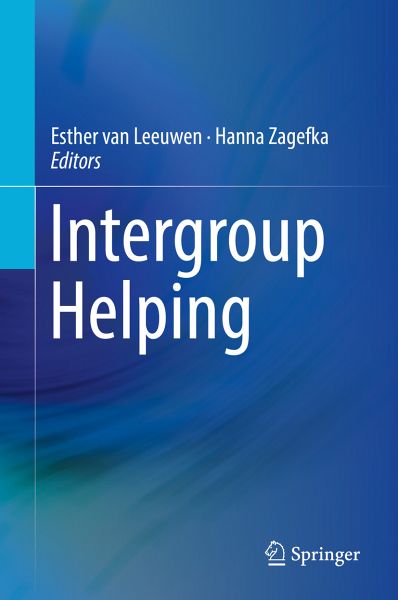
Intergroup Helping (eBook, PDF)
Versandkostenfrei!
Sofort per Download lieferbar
104,95 €
inkl. MwSt.
Weitere Ausgaben:

PAYBACK Punkte
52 °P sammeln!
The aim of this volume is to provide an overview of research from different psychological domains with regards to intergroup helping, arguing for intergroup helping as a research area in and of itself. Historically, research on intergroup relations has largely overlooked helping between groups-which, combined with the fact that most of the research on altruism and helping has focused on individuals, meant that intergroup helping was primarily looked at as deriving from negative intergroup interactions, such as ingroup bias or discrimination. However, over the last decade, a small but growing g...
The aim of this volume is to provide an overview of research from different psychological domains with regards to intergroup helping, arguing for intergroup helping as a research area in and of itself. Historically, research on intergroup relations has largely overlooked helping between groups-which, combined with the fact that most of the research on altruism and helping has focused on individuals, meant that intergroup helping was primarily looked at as deriving from negative intergroup interactions, such as ingroup bias or discrimination. However, over the last decade, a small but growing group of researchers started to investigate intergroup helping as a positive social act occurring between and amongst groups. With contributions from these expert researchers, this volume makes the case that intergroup helping should be studied as a phenomenon in and of itself, not as a mere expression of negative intergroup behaviour.
To advance this argument, the first section covers traditional research approaches in which the willingness to help other groups is construed as a form of discrimination. Then, the second section looks at the reasons why people may be motivated to help other groups. Finally, the last section explores intergroup helping in real world settings, looking at natural disaster responses and the role of morality, among other topics, demonstrating that intergroup relations can be truly positive. Thus, Intergroup Helping: The Positive Side of Intergroup Behavior informs researchers in positive and group relations psychology about the current state of affairs of research on intergroup cooperation and helping, and sets out an agenda for further exploration. Tapping into a current trend towards positive psychology, it moves away from the traditional view within intergroup relations research of the group as a 'source of trouble', and instead focuses on truly positive intergroup relations, with the ultimate goal of promoting real positive behaviour that breaches the intergroup divide.
To advance this argument, the first section covers traditional research approaches in which the willingness to help other groups is construed as a form of discrimination. Then, the second section looks at the reasons why people may be motivated to help other groups. Finally, the last section explores intergroup helping in real world settings, looking at natural disaster responses and the role of morality, among other topics, demonstrating that intergroup relations can be truly positive. Thus, Intergroup Helping: The Positive Side of Intergroup Behavior informs researchers in positive and group relations psychology about the current state of affairs of research on intergroup cooperation and helping, and sets out an agenda for further exploration. Tapping into a current trend towards positive psychology, it moves away from the traditional view within intergroup relations research of the group as a 'source of trouble', and instead focuses on truly positive intergroup relations, with the ultimate goal of promoting real positive behaviour that breaches the intergroup divide.
Dieser Download kann aus rechtlichen Gründen nur mit Rechnungsadresse in A, B, BG, CY, CZ, D, DK, EW, E, FIN, F, GR, HR, H, IRL, I, LT, L, LR, M, NL, PL, P, R, S, SLO, SK ausgeliefert werden.












